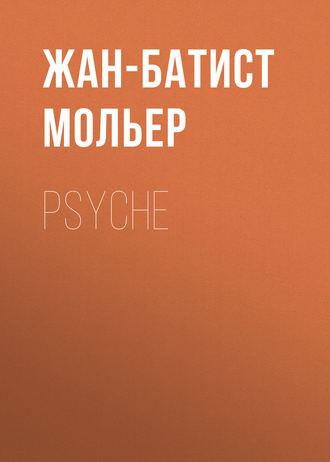
Мольер (Жан-Батист Поклен)
Psyche
ACT II
SCENE I.
– THE KING, PSYCHE, AGLAURA, CIDIPPE, LYCAS, and FOLLOWERS.
Psy. The cause of your tears, my Lord, is dear to me; but you are too kind when you allow a father's love to overmaster the duties of a great king. The homage which here you pay to nature is fraught with too much injury to the rank which you hold. I must decline its touching favours. Check somewhat the sway of your grief over your wisdom, and cease to honour my destiny with tears, which, springing from a king's heart, show weakness.
King. Ah! my daughter! close not my eyes to these tears; my grief is reasonable, even though it be extreme; and when such a loss as mine must endure for ever, wisdom herself, believe me, may weep. 'Tis in vain that pride of regal sway bids us be insensible to such calamities; as vain for reason to come to our help, and desire us to see with unmoved eye the death of what we love. The effort required is barbarous in the eyes of the universe – 'tis brutality rather than highest virtue. In this misfortune I will not wear a show of insensibility, and hide the grief I feel. I renounce the vanity of this fierce callousness, known as fortitude, and whatever be the name given to the keen pain, the pangs of which I feel, I will exhibit it, my daughter, to the gaze of all, and in the heart of a king display that of a man.
Psy. I deserve not this violent grief. Seek, I pray, to resist the claims it asserts over your heart, whose might a thousand events have marked. What! for me, my Lord, you must abandon that kingly firmness of which, under the blows of misfortune, you have shown such perfect proofs?
King. In numberless occasions firmness is easy. All revolutions to which ruthless fortune can expose us – loss of rank, persecution, envy's venom, hatred's dart – present nothing which the will of a soul, but a little swayed by reason, cannot easily brave. But those rigours which crush the heart under the weight of bitter grief are … are the cruel darts of those severe decrees of fate which deprive us for ever of our loved ones. Against such ills reason offers no available weapons. These are the direst blows that the gods in their wrath can hurl against us!
Psy. My Lord, one consolation is still left you. Your marriage has been graced with more than one gift from the gods, and by hiding me from your sight, they with open favour deprive you of nothing but what they have not carefully made good for you. Enough remains to relieve your sorrow, and this law of heaven which you call cruel leaves sufficient room in the two princesses, my sisters, for paternal love wherein to place all its kindness.
King. Ah! empty comfort to my sorrow. There is naught that can console me for thy loss. My grief fills my soul, I am conscious of nothing else; in presence of such cruel destiny, I look to what I lose, and see not what I still retain.
Psy. My Lord, you know better than myself that we must rule our will by that of heaven; and in this sad farewell I can only say to you that which you can much better say to others. These gods are sovereign lords of the gifts they deign to offer us; they leave them in our hands so long only as it pleases them; when they withdraw them, we have no right to murmur over the favours which their hands refuse any longer to pour upon us. My Lord, I am a gift they have offered to your vows, and when, by this decree, they wish to take me back, they deprive you of nothing that you do not hold from them; and it is without a murmur that you must resign me.
King. Ah! seek, I pray, better foundations for the comfort thy heart would offer me. Do not by the fallacy of thy reasoning increase the burden of the piercing grief which now torments me. Dost thou imagine that thou givest me a powerful reason why I should not complain of this decree of heaven? and in this proceeding of the gods, of which thou biddest me be satisfied, dost thou not clearly see a deadly severity? Consider the state in which the gods force me to resign thee, and that in which my hapless heart received thee. Thou shalt know then that they take from me much more than they gave: from them I received in thee, my daughter, a gift I did not ask for; then I found in it but few charms, and without joy I saw my family increased by it. But my heart and my eyes have made a sweet habit of this gift. Fifteen years of care, of watchfulness, of study, have I employed to render it precious to me. I have decked it with the lovely wealth of a thousand brilliant virtues; I have enshrined in it, by assiduous care, the rarest treasures that wisdom yields; to it clings the tenderness of my soul. I have made it the charm, the joy of this heart, the solace of my wearied senses, the sweet hope of my old age. All this they take from me – these gods! And thou wouldst have me utter no complaint concerning this dire edict from which I suffer! Ah! with too much rigour their power tramples upon the affections of our heart. To withdraw their gift, have they not waited till I had made it my all? Rather, if it was their purpose to remove it, had it not been better to give me nothing?
Psy. My Lord! dread the wrath of those gods whom you dare upbraid.
King. After this blow, what more can they inflict on me?
Psy. Ah! my Lord! I tremble for your sins, of which I am the cause; I hate myself for this…
King. Ah! let them bear with my legitimate complaints; 'tis pain enough for me to obey them; it ought to suffice them that my heart abandons thee to the barbarous respect we must bear them, without claiming also to control the grief that so frightful a decree calls forth. My just despair can know no bounds. My grief, my grief, I will nurse it for ever! I will feel for ever the loss I sustain, of heaven's rigour I will always raise high my complaint; until death I will unceasingly weep for that than which the whole world could give me naught more precious.
Psy. +Ah! I pray you, my Lord, spare my weakness. I need constancy in these circumstances. Add not to the excess of my grief by the tears of your fondness. My sorrow alone is deep enough; my fate and your grief are too much for my heart.
King. True! I must spare thee my disconsolate trouble. The fatal moment has come. I must tear myself from thee; but how can I utter this dreadful word? And yet I must! Heaven commands it. An unavoidable cruelty forces me to leave thee in this fatal spot. Farewell, I go… Farewell.
SCENE II.
– PSYCHE, AGLAURA, CIDIPPE.
Psy. Follow the king, my sisters; dry his tears, solace his grief. You would fill him with alarm were you to, expose yourselves to my misfortune. Preserve for him whatever he possesses still; the serpent I expect might prove hurtful to you, and draw you in the same fate as myself; nay, through your death might cause me a second death. Me alone has heaven condemned to his poisonous breath; nothing could save me; and I need no example to die.
Agl. Grudge us not this cruel privilege of mingling our tears with your sorrows; suffer our sighs to answer your last sighs; accept this last pledge of our tender love.
Psy. 'Tis but to lose yourselves to no purpose.
Cid. 'Tis to hope for a miracle in your favour, or to accompany you to the tomb.
Psy. What room is there for hope after such an oracle?
Agl. An oracle is ever veiled in obscurity; the more we believe that we know its meaning, the less do we understand it. Perhaps, after all, you must expect from it nothing but glory and happiness. Suffer us, dear sister, to behold this mortal dread deceived by a worthy issue; or at least let us die with you, if heaven does not show itself more propitious to our prayers.
Psy. Dear sister, lend a readier ear to nature's voice, which summons you to stand by the king. You love me too much, and duty murmurs; you know its unavoidable laws. A father ought to be dearer to you than myself; become both the mainstays of his old age. A thousand kings, a thousand rival kings, cherish love for you; you both owe your father a son-in-law and grandchildren. A thousand kings vie with each other to whisper their vows to you. Me alone the oracle demands, and alone, too, I will die, if I can, without weakness, or, if not, at least without you as witnesses of that little which nature has left me.
Agl. Then by sharing your woe we annoy you!
Cid. I dare go somewhat further, we offend you!
Psy. No; but you add to my torture, and perhaps increase the wrath of heaven.
Agl. It is your will; we go. May that same heaven, more just, and less severe, decree for you the fate we desire, and for which our sincere friendship, in spite of you and of the oracle, still hopes!
Psy. Farewell. This hope, these vows, my sisters, none of the gods will ever fulfil.
SCENE III.
– PSYCHE (alone).
Alone, at last, I can look on this terrible change, which from the summit of highest glory hurls me to the tomb. This glory was without parallel. Its sheen spread from pole to pole; all kings seemed created to love me; all their subjects, looking upon me as on a goddess, were but now beginning to accustom me to the incense they never ceased to offer; sighs followed me, for which I gave naught in return. My soul remained fancy-free, while it captivated so many, and in the midst of so much love was queen of all hearts, and yet mistress of my own. Oh! heaven! hast thou counted a crime this want of feeling? All this severity which thou dost exhibit, is it because in return for their vows I have given nothing but esteem? If such be thy law, why didst thou not create in me that which merit and love create in others, and… But what do I see here?
SCENE IV.
– CLEOMENES, AGENOR, PSYCHE.
Cle. Behold in us two friends, two rivals, whose only wish is to expose our life to save yours.
Psy. Can I listen to you when I have refused two sisters? Princes! think you that you could defend me against heaven? To surrender yourselves to the serpent, whose coming I must await here, is but a despair ill-becoming great hearts; and to die when I die is to overwhelm a sensitive, soul, that already has but too many sorrows.
Age. A serpent is not invincible; Cadmus, who loved no one, slew Mars' own reptile. We love, and Love makes everything possible for the heart that follows his standard, for the hand of whose darts he is himself the guide.
Psy. Do you expect his aid in behalf of an ungrateful one whom all his shafts have been unable to wound? Think you he can stay his vengeance, when 'tis bursting forth, and help you to release me from its stroke? Even if you should serve me, even if you should restore me to life, what reward do you hope for from that which knows no love?
Cle. It is not by the hope of so lovely a reward that we are animated. We seek only to obey the dictates of a love that dares not presume, whatever its efforts may be, that it can be so fortunate as to please you, so worthy as to kindle within you a responsive flame.
Age. Live, fair princess, and live for another; we will behold it with a jealous eye, we will die of it, yet of a death sweeter far than if we had to see you die. If we cannot save your life by the loss of ours, whatever love you may prefer to ours, we are ready to die of grief and of love.
Psy. Live, Princes, live, and no longer seek to ward off or to share my fate. I believe I have told you, heaven seeks me alone; me alone has it condemned. Methinks, I hear already the deadly hissing of its minister, who even now draws nigh. My dread pictures him to me, ever offers him to my view. Fear has mastered all my feelings; under its influence I see him on the summit of this rock; I sink for very weakness, and my fainting heart scarce keeps up a remnant of courage. Farewell, Princes; flee, lest he poison you.
Age. We have seen nothing as yet to astonish us. And since you deem your death so nigh, if strength fail you, we have both arms and hearts which hope never forsakes. It may be a rival has dictated this oracle; and gold has made its interpreter speak. It would be no miracle if a man has answered in the stead of a dumb deity; and everywhere we have but too many examples that temples, no less than other places, are the abode of the wicked.
Cle. Suffer us to oppose to the cowardly ravisher to whom sacrilege abandons you a love that heaven has chosen for the defender of the only fair one for whom we wish to live. If we dare not aspire to her possession, at least, in the midst of her danger, allow us to follow the ardour and dictates of our passion.
Psy. These dictates, this extreme ardour, with which your hearts are filled in my behalf, obey them in behalf of others, in behalf of my sisters. Live for them, since I die. Lament the cruel rigour of my fate; and by your death do not give my sisters new ground for sorrow. These are my last wishes, and in all ages the orders of the dying have been received as law.
Cle. Princess…
Psy. Once more, Princes, live for my sisters. So long as you love me, you must obey me; do not drive me to hate you, and to look upon you as rebels for being too faithful to me. Go, leave me to die alone in this spot, where I have no voice left except to say farewell. But I feel myself lifted up, and the air opens a road whence you will no longer hear this dying voice. Farewell, Princes, farewell, for the last time. See, can you doubt my destiny?
Psyche is borne through the air by two Zephyrs.
Age. We lose sight of her. Prince, let us both seek on the summit of this rock some means of following her.
Cle. Let us seek those of not surviving her.







